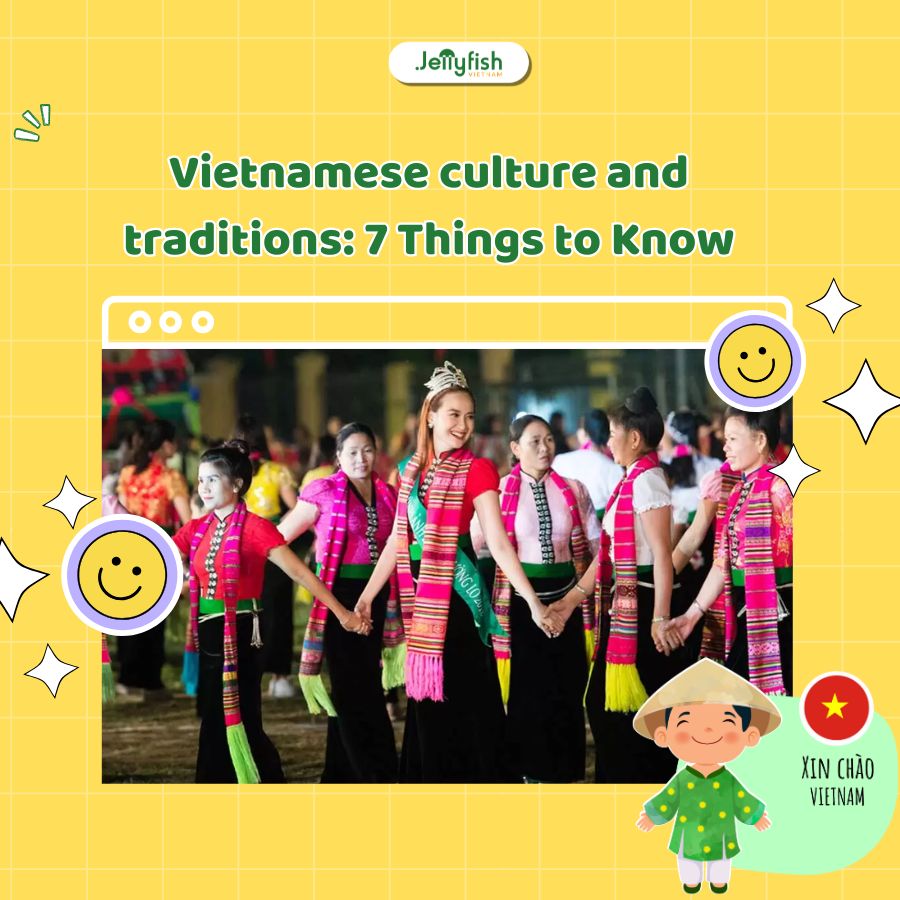Vietnam is a land rich in history, traditions, and cultural values that shape the everyday lives of its people. In this article, Jellyfish will share key insights into Vietnamese culture and traditions from family values and social customs to festivals, food, and spiritual beliefs to help you better understand and appreciate this beautiful Southeast Asian country.
1. The importance of Family
Family is the cornerstone of Vietnamese society. Extended families often live close together or under the same roof, and generations maintain strong bonds. Respect for elders is deeply embedded in daily life and decision-making.
- Children are taught to obey parents and care for grandparents.
- Ancestor worship is commonly practiced through altars placed in homes.
- Major decisions, such as marriage or job changes, often involve consultation with family.
This emphasis on family reflects the Confucian values that continue to shape Vietnamese culture and traditions today.
2. Respect and hierarchy in social interactions
Social hierarchy plays a major role in communication and behavior. Age, job title, and social status affect how people speak and act toward one another.
- Vietnamese has different pronouns based on age and relationship (e.g., “anh” for older brother, “chị” for older sister).
- In meetings or family settings, the eldest is often served or greeted first.
- Addressing people properly is a sign of respect and cultural awareness.
These subtle nuances are essential to navigating Vietnamese traditions respectfully.
3. Celebrating traditional festivals
Vietnamese festivals are colorful and meaningful, often rooted in agricultural cycles or spiritual beliefs. Among the most important:
- Tết (Lunar New Year): The most celebrated holiday in Vietnam, where families gather, visit ancestors, and exchange lucky money.
- Mid-Autumn Festival (Tết Trung Thu): Celebrates children with lantern parades and mooncakes.
- Hung Kings’ Festival: A national holiday to honor Vietnam’s legendary founding fathers.
4. Traditional clothing: The elegance of Ao Dai
The Ao Dai, a long tunic worn over pants, is the most iconic symbol of Vietnamese traditional attire. Worn on formal occasions, school events, and festivals, it blends modesty with elegance.
- Ao Dai reflects both modern fashion and cultural pride.
- The dress comes in various styles for men and women.
- While not worn daily, it’s still a strong symbol of identity.
You’ll often see students, teachers, and brides wearing Ao Dai during major celebrations, a proud representation of Vietnamese traditions.

5. Vietnamese cuisine: harmony of flavors
Food is at the heart of Vietnamese culture. Every dish is a careful balance of flavors – sweet, sour, salty, and spicy – often using fresh herbs, vegetables, and fish sauce.
- Pho (noodle soup) and Banh Mi (Vietnamese baguette sandwich) are globally known.
- Meals are often shared family-style, and rice is a daily staple.
- Street food culture is vibrant and affordable in every city.
Eating together isn’t just about food – it’s about bonding, making cuisine a delicious part of Vietnamese culture and traditions.

6. Traditional beliefs and spirituality
Vietnamese spirituality blends Buddhism, Taoism, Confucianism, and local folk beliefs.
- Many homes have ancestral altars, and people pray for health, prosperity, and protection.
- Visiting pagodas on the first days of the Lunar New Year is common.
- Spiritual practices like feng shui and lucky numbers influence daily life and architecture.
Even modern Vietnamese often respect and preserve spiritual traditions, showing the strong connection between the past and present.
7. Hospitality and community spirit
Vietnamese people are known for their hospitality and friendliness toward guests and foreigners.
- It’s common for hosts to offer tea, snacks, or even meals to visitors.
- Community spirit is strong in rural areas, where neighbors help each other during festivals or harvest seasons.
- Asking personal questions like age or job may seem intrusive but is meant to show interest and build rapport.
Hospitality is a key part of Vietnamese culture and traditions, making the country a welcoming place for travelers and newcomers.
SEE MORE: FUNNY VIETNAMESE PHRASES
Conclusion
Vietnamese culture is rich in values, rituals, and everyday customs that continue to thrive in modern society. From the importance of family and ancestral worship to the elegance of traditional festivals and dress, Vietnamese culture and traditions offer a beautiful blend of past and present. Whether you’re visiting for a short trip or planning to live in Vietnam, understanding these cultural foundations will help you build deeper relationships and show respect for the country’s unique heritage.
Start Learning Vietnamese with Jellyfish Today
Understanding Vietnamese culture and traditions begins with mastering the language. Whether you’re traveling, working, or planning to live in Vietnam, learning Vietnamese will help you connect more deeply with the people and their way of life.
At Jellyfish, we offer professional Vietnamese language courses designed specifically for foreigners:
- Taught by experienced, native-speaking instructors
- Practical topics covering daily life, customs, and culture
- Flexible schedules for all levels – from beginner to advanced
- Both online and in-person classes available
👉👉 Learning Vietnamese – Jellyfish Vietnam
✦ Hotline: 096 110 6466
✦ Head office: 1st Floor, Web3 Tower Building, Alley 4 Duy Tan Street, Cau Giay District, Hanoi
✦ Branch office: Sholega building, 275 Lach Tray, Ngo Quyen, Hai Phong
✦ Head office in Japan: 4F Westhill Building, Nishigotanda 2-24-4, Shinagawa, Tokyo, Japan


